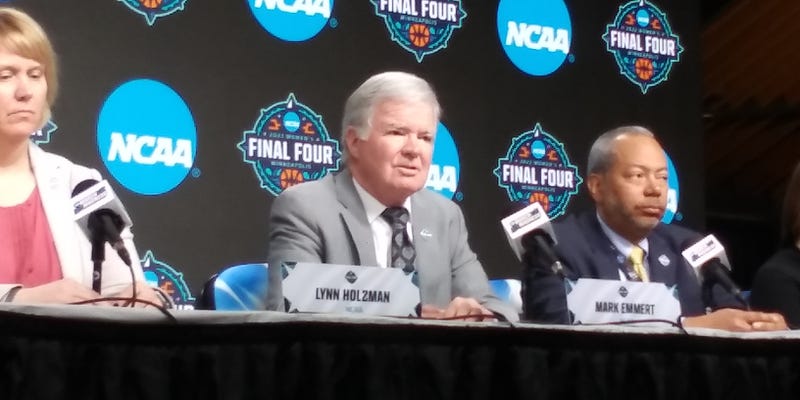
In Minneapolis for the Women’s Final Four this week, NCAA President Mark Emmert is facing questions around equality in college athletics as the women get set to crown a national champion.
One year after glaring inequities were revealed at the women’s NCAA Tournament and less than two weeks after sharp criticism from Congress, Emmert declared on Wednesday that he was happy with the institution’s progress but said there had only been “preliminary discussions” about distributing tournament revenues to women’s programs.
“Here in Minneapolis, all of our corporate partners are engaged in some kind of activation, which is about twice what is normally the case at a women’s Final Four,” Emmert says. “They’re engaged as much as anything because they recognize the value proposition of women’s basketball.
That’s a great thing.”
Emmert said the work ahead improving conditions for women’s basketball includes negotiating a new television contract for the women’s tournament and potentially having a similar revenue distribution protocol as the men’s event.
Emmert was careful not to call for specific changes ahead of discussions by the NCAA’s hundreds of member schools, and he declined to offer his own viewpoint.
“It’s up to the schools and what they want to do in that regard,” he said at the site of the women’s Final Four in Minneapolis. “It’s a complicated relationship because the championships on the men’s side, the relative weight of moving forward in the tournament has been diminished over time. Those in the membership who think there shouldn’t be that much emphasis on winning in the tournament.”
Sending money to the women’s programs is something coaches have been clamoring for. Men’s conferences receive hundreds of thousands of dollars per tournament game involving one of their teams, money they then redistribute to schools. There’s no such system on the women’s side.
Emmert said adopting such a payment structure won’t be a quick fix and will require approval from several NCAA committees.
“There’s really only just preliminary discussions about it,” he said. “I would hope those are decisions that can be made within the next calendar year, for example. If by this time next year there’s some notion of a direction to go in, that would be great.”
It’s easier to pay the men thanks to the NCAA’s deal with CBS and Turner. The original contract averaged $770 million per year with an extension in 2016 jumping that per-year average to $1.1 billion in 2025.
The women’s tournament currently is bundled with other women’s championships for TV rights. The current contract with ESPN is up in 2024. ESPN is giving each game in this tournament its own window on one of its channels, with four games on ABC for a second straight year.
Then there is the question of transgender athletes. Emmert says they’ll look at the Olympic model which puts no restrictions on transgender athletes participating.
“But they also reserve the right to talk to the committee on the medical aspects of sport to make sure that model, whatever the Olympics is using, is also consistent with collegiate athlete healthy well-being and inclusion,” Emmert said Wednesday. “The board is committed to using the same standards as the Olympics, and simply phasing them in so athletes know what those standards are far enough in advance that they can make decisions appropriately.”
The games themselves begin Friday night with South Carolina vs. Louisville and Stanford vs. Connecticut. Emmert says they’re excited for a fantastic finish to the tournament.
“I’m looking forward to what I think is going to be a remarkable three games, and crowning a new champion,” Emmert said. “We’ve got four amazing teams right now, and they’ve been able to play some remarkable basketball the last couple of weeks.”


